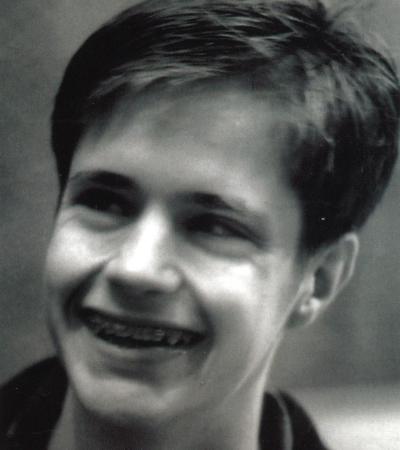Additional Resources
- Matthew Shepard Foundation
- Sheerin, Jude. “Matthew Shepard: The Murder that Changed America," BBC News, October 26, 2018.
- Biography. "Matthew Shepard." Last modified October 7, 2020.

No one should have to die for being who they are. But in 1998, that's exactly what happened to 21-year-old Matthew Shepard, a gay college student who loved cherry pie, performing in plays, and making friends around the world. On a cold October night in Laramie, Wyoming, Shepard was brutally pistol-whipped, tied to a fence, and left for dead. His shocking murder would galvanize a national movement against anti-LGBTQ+ violence and hatred, forever changing the landscape of LGBTQ+ rights in America.
Matthew Shepard was born on December 1, 1976, to Dennis and Judy Shepard in Casper, Wyoming. A premature baby, he was always the shortest kid in his class. His friends and family called him Matt. Shepard attended Casper schools, was an altar boy at the local Episcopal church, and played Little League baseball. With a knack for performing, he appeared in school plays and community productions.
In 1993, just before his junior year of high school, his family moved to Saudi Arabia. Because no American high school existed in Saudi Arabia, Shepard attended The American School in Switzerland until he graduated in 1995. Peers from both Casper and Switzerland remember Shepard as easy to talk to and kind. He had a bounce in his step, and with his ready smile, made friends from around the world. He developed a love for travel.
Shepard had started telling a few close friends and his parents he was gay after he graduated from high school in 1995. By 1998, he was openly gay as a member of the University of Wyoming's Lesbian, Gay, Bisexual, Transgender, and Asexual/Ally (L.G.B.T.A.) student group. Shepard had been in Laramie for only a few months and had begun to heal from a traumatic gang rape he experienced in Morocco when he was in high school, when he suffered unthinkable, horrific violence again.
On October 6, 1998, Shepard went to a L.G.B.T.A. meeting to plan for Gay Awareness Week. After the meeting, the members went to the Village Inn restaurant. His friends remember Shepard eating cherry pie. He invited them to go to the Fireside Lounge, but no one was interested. One member drove him home, thinking he was going to stay in for the night. However, Shepard decided to go to the Fireside alone.
Shepard arrived at the Fireside around 10:30 P.M. He sat at the bar, ordered drinks, and talked to the bartender. Around 11:45, Aaron McKinney and Russell Henderson, two local roofers about Shepard's age, walked in and ordered a pitcher of beer. They played pool, hung out for a while, and talked to Shepard briefly. The bartender noticed Shepard leaving with McKinney and Henderson sometime after midnight.
The killers admit that they posed as gay in order to lure Shepard into the truck and rob him, solidifying Shepard's sexual orientation as key to the perpetration of the crime from the beginning. As they drove away, McKinney told Shepard they were not gay and planned to rob him. One or both of them beat Shepard with the butt of a gun inside the truck and took his wallet. About a mile east of town, Henderson tied Shepard to a split-rail fence with a clothesline. McKinney proceeded to brutally pistol whip Shepard with a three-pound revolver, striking him 18 times on his head and face. They took Shepard's wallet, keys, and shoes, then left him to die. Shepard was discovered 18 hours later when a bicyclist found him. He died five days later on October 12, 1998, in Fort Collins, Colorado.
Shepard's life and tragic death caused a national outcry against hatred of LGBTQ+ individuals that continues today. The terrible experiences surrounding his death inspired his parents to create the Matthew Shepard Foundation "to replace hate with understanding, compassion, and acceptance." In 2009, President Obama signed the Matthew Shepard and James Byrd, Jr. Hate Crimes Prevention Act, which expanded the federal definition of hate crimes to include those motivated by a victim's actual or perceived sexual orientation, gender identity, or disability. The Act also gave the Department of Justice jurisdiction to investigate and prosecute these bias-motivated crimes.
Shepard's life and death also advanced LGBTQ rights through the arts. Moises Kaufman wrote the play, The Laramie Project; Craig Hella Johnson composed the oratorio, Considering Matthew Shepard; and other artists created feature films, documentaries, and songs. These works show Matthew Shepard as he was - a complex, multidimensional human being who could have been your classmate, friend, sibling, or neighbor.
Matthew Shepard was an openly gay student who attended the University of Wyoming for only a few months before he was brutally murdered on October 6, 1998, by two local men. Shepard’s life and tragic death caused a national outcry against hatred of homosexuals that still continues today. The collection includes materials from various sources such as the Office of President of the University of Wyoming and a campus LGBTQ organization. The items include correspondence, news articles, fliers, posters, editorials, bulletins, and speeches.
Rulon Stacey was a doctor and the President and CEO of Poudre Valley Hospital in Ft. Collins, Colorado, in October 1998 where Matthew Shepard was taken, and then died 5 days after he was violently beaten. Stacey acted as a spokesperson for the Shepard family during the time Matthew was hospitalized. The collection includes correspondence, photos, and a memory book about Shepard from the Poudre Valley Hospital employees.
Spectrum was a University of Wyoming LGBTQ student organization. The collection includes a file of Matthew Shepard materials such as correspondence Spectrum received from other student organizations across the country, newspaper clippings and memorial programs.
Additional content for this collection can be found in the “Inventory for collection.”